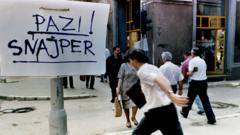Bosnia's 16-Century Ferhad Pasha mosque re-opens
- Published
This video can not be played
To play this video you need to enable JavaScript in your browser.
The 16th Century mosque is under Unesco protection and is seen as an outstanding example of Ottoman architecture
Thousands of people have attended the re-opening of a 16th-Century mosque in Bosnia which was destroyed by Serb forces during the war of the 1990s.
The Ferhad Pasha mosque in Banja Luka is seen as a masterpiece of Ottoman architecture. It took 14 years to rebuild, mostly using original stones.
More than a dozen of Banja Luka's mosques were destroyed during the war.
The Bosnian Serb authorities say the re-opening demonstrates their commitment to ethnic tolerance.
The mosque was blown up 23 years ago, at the height of the Yugoslav civil war when Bosnian Muslims (Bosniaks), Croats and other non-Serbs were expelled from their homes in a tactic known as ethnic cleansing.
Tight security
Known as the Ferhadija, the mosque was rebuilt after architects managed to recover about two-thirds of the original stone and use plans drawn up when an earthquake damaged it in the 1960s.

The interior of the mosque has been restored to its former beauty

Muslims were bussed in for the event from far and wide

The re-opening has been described by religious leaders from all denominations as a joyous event

Thousands of Muslims offered prayers in celebration of the re-opening

Turkey's outgoing Prime Minister Ahmet Davutoglu formally carried out the re-opening ceremony
Saturday's re-opening took place amid tight security, with about 1,000 police officers patrolling the streets as buses arrived with Muslims from across the country.
Traffic was barred from the city centre and alcohol consumption was banned.
Turkey financed part of the rebuilding and outgoing Prime Minister Ahmet Davutoglu re-opened the mosque in front of a congregation of about 10,000 people.
He said the new building sent a message of peace.
"Bosnia-Herzegovina, with its Muslims, Catholics, Orthodox and Jews, is one body, one heart. If there is any attempt to split it up, it means that this one heart would be split," he said in an apparent reference to secessionist threats by Bosnian Serbs.
Bosnia's Grand Mufti, Hussein Kavazovic, called the re-opening "a joyous day for all".
Banja Luka's Orthodox and Catholic bishops added their congratulations - while the president of Bosnia's Jewish community said the co-operation showed how people should live in the region.
The re-opening was also welcomed by the UN and the EU.
At least 100,000 people in total died during fighting in the the Bosnian war. The conflict lasted nearly four years before a US-brokered peace deal brought it to an end in 1995.
Banja Luka is the capital of the Republika Srpska - one of two entities comprising Bosnia-Herzegovina.
It is estimated that now only about 10% of Banja Luka's pre-war Muslim and Croat population remain in the city.
- Published18 March 2016
- Published11 October
- Published24 March 2016


